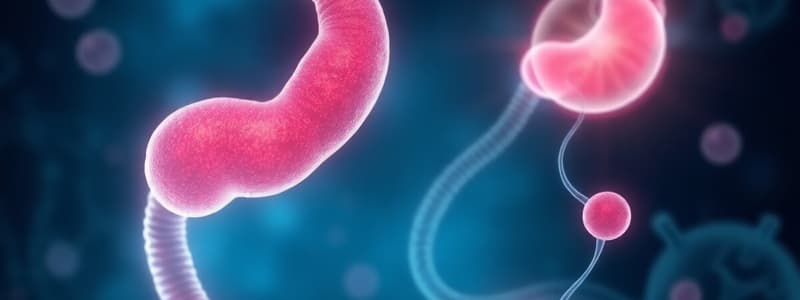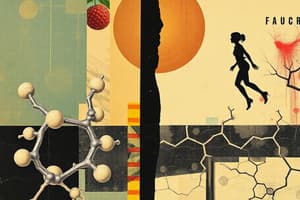Podcast
Questions and Answers
What is the primary process by which glucose is synthesized from non-carbohydrate sources?
What is the primary process by which glucose is synthesized from non-carbohydrate sources?
- Glycogenolysis
- Glycogenesis
- Glycolysis
- Gluconeogenesis (correct)
Which hormone is primarily responsible for increasing blood glucose levels during fasting?
Which hormone is primarily responsible for increasing blood glucose levels during fasting?
- Growth Hormone
- Cortisol
- Insulin
- Glucagon (correct)
What is the term for the breakdown of glycogen into glucose?
What is the term for the breakdown of glycogen into glucose?
- Lipolysis
- Glycolysis
- Glycogenolysis (correct)
- Glycogenesis
Which of the following processes involves the conversion of acetyl-CoA to fatty acids?
Which of the following processes involves the conversion of acetyl-CoA to fatty acids?
Which hormone's deficiency can significantly impact cardiovascular health and glucose homeostasis?
Which hormone's deficiency can significantly impact cardiovascular health and glucose homeostasis?
What is a primary role of lipoprotein lipase (LPL) in the body?
What is a primary role of lipoprotein lipase (LPL) in the body?
Which of the following is NOT an effect of insulin in skeletal muscle?
Which of the following is NOT an effect of insulin in skeletal muscle?
How does insulin affect glucose metabolism in the liver?
How does insulin affect glucose metabolism in the liver?
Which factor is known to inhibit insulin secretion?
Which factor is known to inhibit insulin secretion?
What is the primary function of beta-keto acids in relation to insulin?
What is the primary function of beta-keto acids in relation to insulin?
What action does the hormone GIP have on insulin secretion?
What action does the hormone GIP have on insulin secretion?
What is the primary result of glucose metabolism in pancreatic beta cells?
What is the primary result of glucose metabolism in pancreatic beta cells?
What is a common effect of insulin on cellular potassium levels?
What is a common effect of insulin on cellular potassium levels?
Which hormone is produced by the K cells of the intestine?
Which hormone is produced by the K cells of the intestine?
What effect does insulin have on gluconeogenesis in the liver?
What effect does insulin have on gluconeogenesis in the liver?
What is the primary role of insulin in metabolism?
What is the primary role of insulin in metabolism?
Which hormone is responsible for increasing plasma glucose levels?
Which hormone is responsible for increasing plasma glucose levels?
Where does insulin primarily exert its effect on glucose metabolism?
Where does insulin primarily exert its effect on glucose metabolism?
What kind of hormone is insulin classified as?
What kind of hormone is insulin classified as?
What effect does somatostatin have on insulin and glucagon?
What effect does somatostatin have on insulin and glucagon?
Which process does insulin NOT promote?
Which process does insulin NOT promote?
Which hormone opposes the action of insulin by promoting glycogen breakdown?
Which hormone opposes the action of insulin by promoting glycogen breakdown?
What is the role of GLUT4 in insulin action?
What is the role of GLUT4 in insulin action?
Which hormone is synthesized from proinsulin?
Which hormone is synthesized from proinsulin?
What is the main effect of adrenaline (epinephrine) regarding glucose metabolism?
What is the main effect of adrenaline (epinephrine) regarding glucose metabolism?
What is the effect of glucagon on glucose levels?
What is the effect of glucagon on glucose levels?
What is NOT a response to insulin binding to its receptor?
What is NOT a response to insulin binding to its receptor?
What stimulates the release of insulin from pancreatic cells?
What stimulates the release of insulin from pancreatic cells?
Which physiological function is enhanced by insulin in skeletal muscle?
Which physiological function is enhanced by insulin in skeletal muscle?
Flashcards
Glycogenesis
Glycogenesis
The process of forming glycogen from glucose molecules.
Glycogenolysis
Glycogenolysis
The breakdown of glycogen into glucose molecules.
Glycolysis
Glycolysis
The metabolic pathway that breaks down glucose to generate energy.
Gluconeogenesis
Gluconeogenesis
Signup and view all the flashcards
Adipogenesis
Adipogenesis
Signup and view all the flashcards
Insulin's Role in Fat Storage
Insulin's Role in Fat Storage
Signup and view all the flashcards
Hormone-sensitive Lipase (HSL) Inhibition
Hormone-sensitive Lipase (HSL) Inhibition
Signup and view all the flashcards
Amino Acid Uptake in Muscle
Amino Acid Uptake in Muscle
Signup and view all the flashcards
Glucose Uptake Mechanism
Glucose Uptake Mechanism
Signup and view all the flashcards
Glycolysis Promotion
Glycolysis Promotion
Signup and view all the flashcards
Potassium Uptake
Potassium Uptake
Signup and view all the flashcards
GLP-1 Function
GLP-1 Function
Signup and view all the flashcards
GIP Function
GIP Function
Signup and view all the flashcards
Stimulants of Insulin Secretion
Stimulants of Insulin Secretion
Signup and view all the flashcards
Inhibitors of Insulin Secretion
Inhibitors of Insulin Secretion
Signup and view all the flashcards
Insulin
Insulin
Signup and view all the flashcards
Glucagon
Glucagon
Signup and view all the flashcards
Somatostatin
Somatostatin
Signup and view all the flashcards
Epinephrine
Epinephrine
Signup and view all the flashcards
Cortisol
Cortisol
Signup and view all the flashcards
Growth Hormone
Growth Hormone
Signup and view all the flashcards
Anabolic Hormones
Anabolic Hormones
Signup and view all the flashcards
Catabolic Hormones
Catabolic Hormones
Signup and view all the flashcards
GLUT4
GLUT4
Signup and view all the flashcards
Proinsulin
Proinsulin
Signup and view all the flashcards
Insulin Release
Insulin Release
Signup and view all the flashcards
Amylin
Amylin
Signup and view all the flashcards
Thyroid Hormones T3 and T4
Thyroid Hormones T3 and T4
Signup and view all the flashcards
Leptin
Leptin
Signup and view all the flashcards
Metabolism Types
Metabolism Types
Signup and view all the flashcards
Study Notes
Glucose and Lipid Metabolism
- Hormonal Regulation: Insulin, glucagon, somatostatin, epinephrine, growth hormone, and cortisol all regulate glucose, protein, and fat metabolism. Gut hormones (GI hormones) and nutrients also play a crucial role.
Hormonal Effects
- Pancreas: Insulin promotes glucose and lipid storage; Glucagon promotes glucose production; Somatostatin inhibits insulin and glucagon; Amylin inhibits glucagon.
- Pituitary: Growth hormone increases glucose production.
- Adrenal: Epinephrine and cortisol increase glucose production.
- GI Tract: GLP-1, GIP, gastrin, secretin, and CCK alter insulin secretion.
- Adipose Tissue: Leptin, adiponectin, and resistin influence satiety, glucose levels, and insulin resistance.
- Thyroid: T3 and T4 regulate metabolism and metabolic rate.
Metabolic Processes
- Glycogenesis: Formation of glycogen.
- Glycogenolysis: Breakdown of glycogen.
- Glycolysis: Breakdown of glucose to pyruvate or lactate.
- Gluconeogenesis: Synthesis of glucose from non-carbohydrate sources (e.g., lactate, glycerol, amino acids).
- Adipogenesis: Differentiation of pre-adipocytes into adipocytes (fat cells).
- Lipogenesis: Synthesis of fatty acids from acetyl-CoA.
- Lipolysis: Breakdown of fats into fatty acids.
Anabolic vs. Catabolic Hormones
- Anabolic Hormones: Insulin and growth hormone (especially for protein) build storage molecules (protein, fat, glycogen).
- Catabolic Hormones: Glucagon, epinephrine, and cortisol break down larger molecules to release glucose for energy.
Insulin Synthesis and Release
- Insulin is synthesized as proinsulin, processed into insulin and C-peptide.
- C-peptide is a marker for insulin secretion level (1:1 ratio).
- Released in response to increased blood glucose.
- Insulin is a peptide hormone and not a steroid hormone.
Insulin Action Mechanisms
- Rapid Actions: GLUT4 translocation, potassium uptake.
- Intermediate Actions: Protein synthesis, glycolysis activation, glycogen synthesis stimulation.
- Slow Actions: Inhibition of phosphorylase and gluconeogenic enzymes; increased mRNA for lipogenic enzymes.
- Insulin activates PI3 kinase, which causes GLUT4 translocation to the cell membrane for glucose uptake.
Insulin's Effects on Different Organs
- Liver: Increases glucose uptake, glycolysis, glycogen synthesis, lipid synthesis, and protein synthesis.
- Fat Tissue: Increases triglyceride synthesis (storage).
- Skeletal Muscle: Increases protein synthesis, glucose uptake, glycogen synthesis, decreases protein breakdown and gluconeogenesis.
Glucose Stimulated Insulin Secretion
- Glucose enters beta cells via GLUT-2, metabolized, producing ATP, inhibiting potassium channels, causing depolarization, calcium influx triggering insulin release.
Factors Affecting Insulin Secretion
- Stimulators: Glucose, amino acids, beta-keto acids, glucagon, acetylcholine, GIP, GLP-1, secretin, CCK, and beta-adrenergic stimulators.
- Inhibitors: Low potassium concentration, somatostatin, galanin, epinephrine, norepinephrine.
GI Hormones (Gut Hormones)
- GIP (Gastric Inhibitory Peptide): Released by K cells in response to fat and glucose; increases insulin secretion in the presence of glucose.
- GLP-1 (Glucagon-like peptide 1): Released by L cells; increases insulin secretion, reduces glucagon secretion, slows gastric emptying.
- Both GLP-1 and GIP promote beta-cell proliferation and have protective effects.
Cortisol Effects and Aging
- Excess/Deficiency: Can impact cardiovascular health and glucose homeostasis.
- Reduced Growth Hormone with Aging: Affects metabolism.
Meal, Fasting, and Hormone Regulation
- Hormone levels and effects change during meals, between meals, and during fasting, impacting metabolism dynamically.
Studying That Suits You
Use AI to generate personalized quizzes and flashcards to suit your learning preferences.




